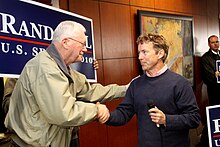Jim Bunning
Bunning gave his farewell speech to the Senate on December 9, 2010, and was succeeded by fellow Republican Rand Paul on January 3, 2011.
He had his breakout season in 1957, when he led the American League in wins (20) and innings pitched (267+1⁄3), and was the starting pitcher for the AL in the All-Star Game.
During the 1963 Winter Meetings, the Tigers traded Bunning and Gus Triandos to the Philadelphia Phillies for Don Demeter and Jack Hamilton.
[17] Bunning is remembered for his role in the pennant race of 1964, in which the Phillies held a commanding lead in the National League for most of the season, eventually losing the title to the St. Louis Cardinals.
Manager Gene Mauch used Bunning and fellow hurler Chris Short heavily down the stretch, and the two became visibly fatigued as September wore on.
He finished with a middling 17–15 record, but posted a career-best ERA (2.29), and led the league in shutouts (6), games started and innings pitched (40/302.1), and strikeouts (253).
[23] Though the MLBPA had been formed in the early 1950s as an attempt to improve pay, benefits, and working conditions for players, team owners were still largely able to impose their will on the players by acting in concert to limit salaries and refrain from offering first rate employee benefits and working conditions, such as suitable stadium locker rooms and a per diem allowance to pay for meals while traveling for away games.
[24] Bunning became active with the MLBPA early in his career, including serving as the pension representative for the American League players and a member of the union's executive board.
[24] Under Miller's direction, in 1968 the MLBPA negotiated its first collective bargaining agreement with the owners, which put the players on the path to improved salaries, benefits, and working conditions.
[24] Over time, the MLBPA also succeeded at eliminating the reserve clause and Major League Baseball's exemption from antitrust laws.
[24] As a result, players were able to negotiate for the right to veto trades, as well as the right to declare free agency and offer their services to the highest bidder.
[25] At the time of Bunning's death, Tony Clark, then serving as MLBPA's executive director, praised Bunning's union activities: "Recognizing the need to ensure that all players receive fair representation in their dealings with major league club owners, Jim, along with a number of his peers, helped pave the way for generations of players.
Bunning won the Republican nomination for the seat, and faced fellow Congressman Scotty Baesler, a Democrat from the Lexington-based 6th District, in the general election.
[35] Bunning was heavily favored for a second term in 2004 after his expected Democratic opponent, Governor Paul Patton, saw his career implode in a scandal over an extramarital affair.
However, due to a number of controversial incidents involving Bunning, the Democrats began increasing financial support to Mongiardo.
Therein when it became apparent that Bunning's bizarre behavior was costing him votes, the Democrats purchased additional television airtime on Mongiardo's behalf.
[44] Bunning was also the only member of the United States Senate Committee on Banking, Housing and Urban Affairs to have opposed Ben Bernanke for Chief of the Federal Reserve.
[46] The magazine dubbed him 'The Underperformer' for his "lackluster performance", saying he "shows little interest in policy unless it involves baseball", and criticized his hostility towards staff and fellow senators and his "bizarre behavior" during his 2004 campaign.
"[47] Bunning reportedly blocked the move to restore public access to the records of past United States Presidents which had been removed under Executive Order 13233.
"[49] In February 2009, at the Hardin County Republican Party's Lincoln Day Dinner, while discussing conservative judges, Bunning predicted that Supreme Court Justice Ruth Bader Ginsburg would likely be dead from pancreatic cancer within nine months.
When Senator Jeff Merkley urged him to drop his objections to vote on a 30-day extension of benefits, Bunning responded "tough shit.
"[59] On March 2, Bunning finally agreed to end his objection to the bill in exchange for a vote on his amendment to pay for the package.
[63] Bunning responded by threatening to sue the National Republican Senatorial Committee if they recruited a candidate to run against him in the primary.
[62] In the last quarter of 2008, the senator's campaign committee Citizens for Bunning had raised $27,000 from 26 separate contributions, ending the year with $150,000 in cash.
[65] In mid-April, KYWORDSMITH.com reported that of the $263,000 that Bunning collected during the first quarter of 2009, over 77% ($203,383) was received from out of state, while over 10% ($28,100) was actually untouchable for another 13 months as it was contributed exclusively for use in a general election.
[68] Kentucky Secretary of State Trey Grayson announced on April 30, 2009, that he would form an exploratory committee to run for Bunning's seat.
[69] However, Bunning said at a Lincoln Day dinner in Kentucky on May 9 that he still planned to run: "The battle is going to be long, but I am prepared to fight for my values.
"[72] On April 14, 2010, in a further show of disdain for GOP leadership and insiders, Bunning announced his support for outsider candidate Rand Paul over establishment favorite Trey Grayson.
Bunning Foundation board members include his wife Mary, and Cincinnati tire dealer Bob Sumerel.
[79] The 1996 Major League Baseball All-Star Game, held in Philadelphia, was dedicated to Bunning and fellow Phillies legends Richie Ashburn, Steve Carlton, Robin Roberts and Mike Schmidt, all of whom threw out the ceremonial first pitch.

